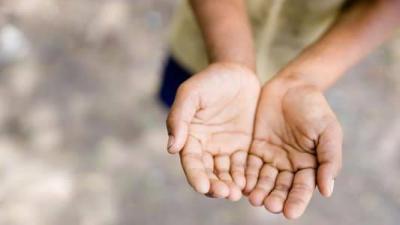A photo of two children sitting alone on a sidewalk at night in Beirut, in low temperatures, sparked a wave of sympathy and anger on social media, as it encapsulated the plight of many poor families abandoned without care or protection from the Lebanese state and relevant authorities. However, this wave of sympathy was short-lived, leaving the "bleak Lebanese scene" unchanged, overshadowing many Lebanese regions plagued by poverty and deprivation. Day by day, the socio-economic crisis deepens, and the living conditions worsen from bad to worse. Concurrently, the political scene becomes increasingly complicated, eliminating any chance for significant and sustainable economic relief for the Lebanese people. Consequently, the poverty rate exacerbates (70% in 2022), and the number of beggars of various kinds continues to rise: organized groups or spontaneous, no longer limited to Syrian refugees but also including Lebanese suffering from poverty, hunger, and unemployment.
Public roads in Beirut and its suburbs are crowded with beggars of all ages, particularly children and young teenagers, who are especially concentrated at roundabouts, intersections, and under bridges. Despite the financial collapse and the diminishing value of her salary, young Rola Nima insists on keeping a few thousand lira in her wallet for the "street boys" she encounters along the road from her home in Jounieh to her office in a ministry in the Hamra area. Even though her salary is worth less than $150 with the dollar surpassing the 41,000 lira mark, she continues to give these boys a small amount that she knows can no longer buy them "a piece of gum." She laments, "They have come to know my face and wait for me every morning. I give them a tiny amount and get from them a sweet invitation that gives me hope and energy to continue my day."
### Hassan and His Brothers' Story
"Please, just 1,000 lira," is a phrase Hassan and his two younger brothers repeat dozens of times from the moment they arrive at the entrance of Hamra Street in the morning until late at night when their father comes to pick them up. According to the begging children’s tariff, there has been no change in the value of the Lebanese lira; they still ask for 1,000 lira, which was more than half a dollar three years ago.
Hassan and a group of children stationed on Hamra Street in Beirut follow daily instructions from their guardians in pursuit of a "generous" yield. They chase passing cars, begging drivers for "the price of a mankoucheh" (a Lebanese flatbread), stop passersby with pleas suitable for the sick, the elderly, mothers, and young girls waiting for "their dream knight." During quiet street moments, they search through garbage bins looking for discarded toys or leftover food.
The children refuse to answer any questions outside their work. The girls, in particular, declined to comment on whether they have experienced harassment or bullying, having spent most of their day in public among people. One girl's brother bravely stated that young men try to harass his sister in exchange for giving her a small amount of money, prompting her to seek his help to fend them off.
### Playing on Emotions!
Unlike Rola, many refuse to respond to the beggars' requests, especially as begging has become the easiest way to collect money. Many believe that refusing to give money to beggars limits the phenomenon, which has become “annoying” and provokes anger among passersby and residents in areas crowded with beggars, especially among organized groups.
One woman from Gemmayze Street noted that organized gangs push children and individuals with special needs into the streets to exploit the compassion of donors. The boys and children appear as victims, claiming to be hungry or victims of abuse from parents if they do not receive money, while the elderly invoke illness or poverty. The woman recalled that some years ago, beggar Fatima Othman was found dead inside a car in the Basta area, revealing that she had a bank account worth one million dollars in one of Lebanon's top banks.
### Ministry of Social Affairs is Helpless
A source in the Ministry of Social Affairs told Al-Qabas that begging children are exploited by their families for money, emphasizing that the ministry is unable to pursue the operators of these children. Their role is limited to awareness or providing a care center, but the problem lies in the absence of care institutions for non-Lebanese children.
The source scoffed when asked about governmental mechanisms to ensure care for street children and prevent their exploitation, stating, “Ministry employees are unable to secure their children’s needs, let alone street children’s.” He stressed that the solution lies in establishing an institution to care for and shelter begging children in the streets, rather than just providing social and psychological support from associations.
### Begging: A Dangerous Malady Beyond Poverty!
It is well known that begging flourishes during wars and crises, explaining its current escalation in Lebanon. No entity possesses accurate statistics on the number of begging children in Lebanon. A source in the Internal Security Forces' public relations division attributed the issue to the diverse nationalities of the beggars, including Syrians, Palestinians, and recently Lebanese. He pointed out that the spread of begging poses significant challenges as it paves the way for social ailments that Lebanon does not need, such as theft, social and moral deviation, and drug abuse. Furthermore, it constitutes a violation of children's rights, depriving them of their most basic rights to social care.




